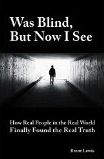"What we talk about when we talk about God"
Review of the book by Rob Bell

It’s so easy to see flaws in the way others approach God, and so difficult to get it right ourselves. That thought comes to mind when reading Rob Bell’s brilliant yet flawed book. When you read just a few pages you think, “This guy is brilliant and a master communicator.” You read a few more and you think, “This guy is sincerely speaking from his heart.” However, the more you read the more you begin to see that underneath all the brilliance, sincerity and great quotes there is a flawed premise— that if God’s revelation doesn’t seem to make sense to people, especially brilliant people, then some accommodation must be made to it to keep Christianity relevant.
Bell starts by comparing traditional concepts of God to an Oldsmobile 88 that he drove in his youth. It served him then, but later became a part of the past and is now irrelevant except for collectors. As he put it,
“For them, not us.
For then, not now.”
Of course the practical problem is determining which “traditional concepts” should be discarded. If he refers to traditional concepts that have been added by theologians through the years to those found in the scriptures we would agree. But, you can’t feel that he has much more in mind than theological mishmash.
The first chapter is titled “hum” and Bell discusses the importance of sensing “reverence humming” in us. Throughout the book, he points out perspectives about God that ancient Hebrews and others used have had, and illustrates them by using various Hebrew and Greek words and even a German one.
The chapter titled “Open,” is the most powerful. There Bell lays out graphic images of the vastness of the universe and the intricacy of cells and life itself and the reader is forced to face two realities: (1) There has to be a supernatural power behind both the universe and life itself and (2) That power, God, is beyond anything we can imagine. The last part of the chapter masterfully states our need for science in some realms and yet its utter inability to deal with other realms.
“Because sometimes you need a biologist,
And sometimes you need a poet.
Sometimes you need a scientist,
And sometimes you need a song.” (p. 76)
Bell expands on this thread in the third chapter titled, “Both.” We need both the mechanical precision of true science, but especially the wonder of God. Some good quotes from this chapter:
* “Technical language has limits. It can describe some thing very well, but in other situations, like love, it falls flat. It’s inadequate, it fails.” (p. 85)
* “So when we talk about God we’re using language, language that employs a vast array of words and phrases and forms to describe a reality that is fundamentally beyond words and phrases and forms.” (p. 87)
The chapter titled “With” points out that God is always with us, which is true to the extent that God is always omnipresent and available to those who reach out to him. As Paul pointed out both on the Areopagus and in Romans, he is not far from us (Acts 17:27; Romans 10:6-10). I can’t think help but think, however, of the fact that when man rebels against God that there is a sense in which God departs just as he left old king Saul (1 Samuel 15:26; 16:24). His presence left the temple because of the idolatry of Judah (Ezekiel 10). This consequence of sin, God’s departure from the rebellious, is one of the Biblical truths that give Rob Bell trouble.
Bell rejects any conditions to receive God’s favor and complains about judgments and sermons about “how God loves you if you’ll just. . .” and “God is for you as long as you . . .” (p. 128) He is absolutely right when he complains in the same context that “boycotts and wars and judgments . . . and inquisitions and placards and crusades and terrible PR” have covered up the “beautiful, life-changing message of God being for us.” That last point is right because such tactics are not found among Christ’s disciples in the scriptures and represent a this-worldly focus that is at odds with the otherworldly focus of the New Testament. However, the fact that such methods are wrong and counterproductive does not detract from the fact that God is not for the wicked, the rebellious nor the presumptuous while they persist in their evil. God was not for Hitler. He was not for the children of Israel when they rebelled against Him. Of course, God is for the sinful in the sense that he wants them to leave their sins and come to Him, but he is not for them in their rebellion. Bell’s line of reasoning is at odds with God promises of blessings for an obedient Israel (Deut. 28:1-14) and curses for disobedience (Deut. 28:1-68). There are horrible consequences for disobedience and rebellion. That spiritual truth conflicts with much of the teaching in the book.
Chapter 6, titled “Ahead” is my second favorite chapter, pointing out clearly and correctly that Old Testament laws were never designed to reflect God’s ideals. Often critics jump on such laws to criticize the Bible, misunderstanding of course that their purpose was to take primitive, backward people incrementally towards God’s ideal. Many of the points he makes are also made in Paul Copan’s excellent book, “Is God a Moral Monster?” A question I would have if I could ever talk personally with Rob Bell would be whether he thinks the New Testament reflects God’s ideals, or whether we have now, though some mysterious new source or revelation, a way of coming even closer to God, discarding any New Testament teaching that we feel to be outmoded.
I think I can illustrate the greatest problem behind the premise of the book from a section in the very first chapter. There, Bell wrote about a woman who heard “an influential Christian leader talk openly about how he didn’t think women should be allowed to teach and lead in the church.” (Page 6) According to Bell, she was stunned, and to top it off, “she had two master’s degrees.” I doubt that the influential Christian leader that Bell had in mind was the apostle Paul, but his words describing the leader’s message are close to the same words that the inspired apostle used in 1 Timothy 2:11,12. However, since that teaching is not palatable in our 21st century society, many like Bell feel that it should be rejected. This approach is unintentionally insulting to the brilliant women with and without master’s degrees who have humbly submitted to God’s teaching about subjection. In Bell’s world, it’s as if two masters’ degrees make you incapable of subjection. If Jesus taught us anything it is that there is virtue in subjection. However, some people, especially the brilliant and those enamored with worldly learning just can’t bring themselves to submit.
The truth is that the message of the true God has never been appealing to the wise and learned of this age (Matthew 11:27). They don’t like teaching about subjection, punishment for sin and the afterlife.
"But we preach Christ crucified, a stumbling block to Jews and folly to Gentiles. . . For consider your calling, brothers: not many of you were wise according to worldly standards, not many were powerful, not many were of noble birth. But God chose what is foolish in the world to shame the wise; God chose what is weak in the world to shame the strong; God chose what is low and despised in the world, even things that are not, to bring to nothing things that are, so that no human being might boast in the presence of God." (1 Corinthians 1:23, 26-29)
That fact that God is unfathomable, as Bell eloquently points out, does not mean that His will for us is unknowable. God came down on our level through the incarnation of Jesus Christ and also does it through the inspired scriptures. Though there are many deep and profound things in the scriptures that are difficult to understand (2 Peter 3:15), we can at least know God on a level that is pleasing to him, as we grow in our understanding of them. I think Bell misses this point.
It takes a deep poverty of spirit to be willing to accept all of Christ’s teachings and those of His inspired apostles at face value. Bell partially acknowledges that on page 133. However, when Christ’s teaching is counter-cultural, counter-political and unpopular, those who are worldly wise, and yes, some who have two masters’ degrees, will have a hard time swallowing it. Yes, they are stunned by it. The decision that brilliant people like Rob Bell must make (and also those of us who aren’t nearly as brilliant) is whether to accept God and his teachings at face value, or whether to try to adjust God so that he will become more palatable and conform to cultural and social norms. This is not a new choice, but one that has faced mankind from the very beginning.
Bell starts by comparing traditional concepts of God to an Oldsmobile 88 that he drove in his youth. It served him then, but later became a part of the past and is now irrelevant except for collectors. As he put it,
“For them, not us.
For then, not now.”
Of course the practical problem is determining which “traditional concepts” should be discarded. If he refers to traditional concepts that have been added by theologians through the years to those found in the scriptures we would agree. But, you can’t feel that he has much more in mind than theological mishmash.
The first chapter is titled “hum” and Bell discusses the importance of sensing “reverence humming” in us. Throughout the book, he points out perspectives about God that ancient Hebrews and others used have had, and illustrates them by using various Hebrew and Greek words and even a German one.
The chapter titled “Open,” is the most powerful. There Bell lays out graphic images of the vastness of the universe and the intricacy of cells and life itself and the reader is forced to face two realities: (1) There has to be a supernatural power behind both the universe and life itself and (2) That power, God, is beyond anything we can imagine. The last part of the chapter masterfully states our need for science in some realms and yet its utter inability to deal with other realms.
“Because sometimes you need a biologist,
And sometimes you need a poet.
Sometimes you need a scientist,
And sometimes you need a song.” (p. 76)
Bell expands on this thread in the third chapter titled, “Both.” We need both the mechanical precision of true science, but especially the wonder of God. Some good quotes from this chapter:
* “Technical language has limits. It can describe some thing very well, but in other situations, like love, it falls flat. It’s inadequate, it fails.” (p. 85)
* “So when we talk about God we’re using language, language that employs a vast array of words and phrases and forms to describe a reality that is fundamentally beyond words and phrases and forms.” (p. 87)
The chapter titled “With” points out that God is always with us, which is true to the extent that God is always omnipresent and available to those who reach out to him. As Paul pointed out both on the Areopagus and in Romans, he is not far from us (Acts 17:27; Romans 10:6-10). I can’t think help but think, however, of the fact that when man rebels against God that there is a sense in which God departs just as he left old king Saul (1 Samuel 15:26; 16:24). His presence left the temple because of the idolatry of Judah (Ezekiel 10). This consequence of sin, God’s departure from the rebellious, is one of the Biblical truths that give Rob Bell trouble.
Bell rejects any conditions to receive God’s favor and complains about judgments and sermons about “how God loves you if you’ll just. . .” and “God is for you as long as you . . .” (p. 128) He is absolutely right when he complains in the same context that “boycotts and wars and judgments . . . and inquisitions and placards and crusades and terrible PR” have covered up the “beautiful, life-changing message of God being for us.” That last point is right because such tactics are not found among Christ’s disciples in the scriptures and represent a this-worldly focus that is at odds with the otherworldly focus of the New Testament. However, the fact that such methods are wrong and counterproductive does not detract from the fact that God is not for the wicked, the rebellious nor the presumptuous while they persist in their evil. God was not for Hitler. He was not for the children of Israel when they rebelled against Him. Of course, God is for the sinful in the sense that he wants them to leave their sins and come to Him, but he is not for them in their rebellion. Bell’s line of reasoning is at odds with God promises of blessings for an obedient Israel (Deut. 28:1-14) and curses for disobedience (Deut. 28:1-68). There are horrible consequences for disobedience and rebellion. That spiritual truth conflicts with much of the teaching in the book.
Chapter 6, titled “Ahead” is my second favorite chapter, pointing out clearly and correctly that Old Testament laws were never designed to reflect God’s ideals. Often critics jump on such laws to criticize the Bible, misunderstanding of course that their purpose was to take primitive, backward people incrementally towards God’s ideal. Many of the points he makes are also made in Paul Copan’s excellent book, “Is God a Moral Monster?” A question I would have if I could ever talk personally with Rob Bell would be whether he thinks the New Testament reflects God’s ideals, or whether we have now, though some mysterious new source or revelation, a way of coming even closer to God, discarding any New Testament teaching that we feel to be outmoded.
I think I can illustrate the greatest problem behind the premise of the book from a section in the very first chapter. There, Bell wrote about a woman who heard “an influential Christian leader talk openly about how he didn’t think women should be allowed to teach and lead in the church.” (Page 6) According to Bell, she was stunned, and to top it off, “she had two master’s degrees.” I doubt that the influential Christian leader that Bell had in mind was the apostle Paul, but his words describing the leader’s message are close to the same words that the inspired apostle used in 1 Timothy 2:11,12. However, since that teaching is not palatable in our 21st century society, many like Bell feel that it should be rejected. This approach is unintentionally insulting to the brilliant women with and without master’s degrees who have humbly submitted to God’s teaching about subjection. In Bell’s world, it’s as if two masters’ degrees make you incapable of subjection. If Jesus taught us anything it is that there is virtue in subjection. However, some people, especially the brilliant and those enamored with worldly learning just can’t bring themselves to submit.
The truth is that the message of the true God has never been appealing to the wise and learned of this age (Matthew 11:27). They don’t like teaching about subjection, punishment for sin and the afterlife.
"But we preach Christ crucified, a stumbling block to Jews and folly to Gentiles. . . For consider your calling, brothers: not many of you were wise according to worldly standards, not many were powerful, not many were of noble birth. But God chose what is foolish in the world to shame the wise; God chose what is weak in the world to shame the strong; God chose what is low and despised in the world, even things that are not, to bring to nothing things that are, so that no human being might boast in the presence of God." (1 Corinthians 1:23, 26-29)
That fact that God is unfathomable, as Bell eloquently points out, does not mean that His will for us is unknowable. God came down on our level through the incarnation of Jesus Christ and also does it through the inspired scriptures. Though there are many deep and profound things in the scriptures that are difficult to understand (2 Peter 3:15), we can at least know God on a level that is pleasing to him, as we grow in our understanding of them. I think Bell misses this point.
It takes a deep poverty of spirit to be willing to accept all of Christ’s teachings and those of His inspired apostles at face value. Bell partially acknowledges that on page 133. However, when Christ’s teaching is counter-cultural, counter-political and unpopular, those who are worldly wise, and yes, some who have two masters’ degrees, will have a hard time swallowing it. Yes, they are stunned by it. The decision that brilliant people like Rob Bell must make (and also those of us who aren’t nearly as brilliant) is whether to accept God and his teachings at face value, or whether to try to adjust God so that he will become more palatable and conform to cultural and social norms. This is not a new choice, but one that has faced mankind from the very beginning.





 RSS Feed
RSS Feed
